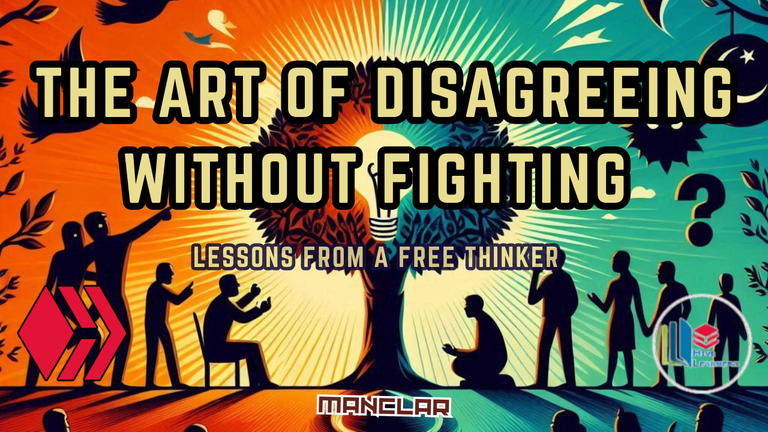The Art of Disagreeing Without Fighting: Lessons from a Free Thinker

This is a publication based on the suggested topic proposed in the Hive Learners community through their discord, which on this occasion is "Settling An Argument".
"The goal of argument should not be victory, but progress."
<< Joseph Joubert >>


Bing AI
Welcome, my esteemed and interesting reader, to my blog.
Today, I will be talking to you about how to resolve a conflict, and the truth is, we’ve all had that moment in our lives when we find ourselves caught in an argument.
In my case, I went through a period where I strongly identified as a free thinker—and I still do. A period, let’s say, of a scientific nature, where my tendency was to explore the spiritual side of things, and during that time, I delved into various religions in search of knowledge.
This led me to become an investigator of arguments, an investigator of science, and in this way, I became a free thinker and an atheist.
During this period, I debated countless times with Catholics and religious people about the existence of God, and despite my arguments being quite logical, I always ran into the stubbornness of fanatical Catholics who opposed my reasoning.
Back then, I remember finding it very amusing to argue with them because I would see—and even laugh at—how blindly they believed in their views and their arguments, and that entertained me. At that time, I was a very different person from who I am today, as I now see things differently.
In those days, I even mocked the arguments they made, especially when it came to religious topics and the subject of God.
Today, as I said, I see things differently, and I handle conflicts in another way.
The first thing I do is focus on listening to the person, hearing everything they have to say, and telling them, for example: "I understand what you’re telling me, I understand your argument and why you feel upset."
And I do this while always staying calm, keeping my composure, and trying to maintain a low tone of voice so that the other person… so that there’s no conflict, so that it doesn’t turn into an aggressive confrontation or a battle over who’s right.


Bing AI
Generally, when it comes to arguing—though I don’t like doing it—if the issue affects me, my values, or my principles, and if I see serious disrespect, then I defend my principles, but without attacking the other person, always avoiding personal attacks.
I usually walk away if I see that the discussion is going in circles, meaning it keeps repeating the same points and growing in anger and aggression. I realize there’s no point, no openness to dialogue, and I stop engaging.
Also, if my relationship with that person isn’t important—for example, if it’s someone on social media—I don’t keep arguing because it’s not worth it.
And if I notice that emotions are running too high and that hurtful things are about to be said, I prefer not to continue the argument.
I focus on how I feel rather than blaming the other person. I don’t usually say things like: "Look, this hurts me when you say these things, when this happens."
Instead of shifting blame and saying, "You’re always at fault, you always ruin everything," no, I prefer not to say it that way.
What I also do, drawing from my experience as a role-playing game master, is apply what I’ve learned from RPGs: when there’s a conflict or argument, I pause it.
I teach this in my game-mastering seminars as well—taking a moment to pause before continuing the conversation or debate.
So I tell them: "Look, let’s take a moment to grab a coffee and talk later," or at another time.


Bing AI
Or I simply say: "Look, I need to step away for a bit, and we can continue this conversation later, tomorrow, or another day."
This is also important: taking that pause, if necessary, so that the discussion can continue with a fresh perspective and without the same aggression and tension.
And I also reflect a lot: Was it worth engaging in this argument or not? And in cases where I let myself get carried away—which used to happen often but doesn’t anymore—I acknowledge it and try to apologize.
But what’s really interesting is trying to avoid arguments altogether.
I don’t avoid them now because I’m afraid or scared of arguing, but because over time, I’ve learned that it’s better to reconcile with people and reach a common agreement that benefits both sides—to learn from their arguments and mine, and then find a middle ground.
This happens a lot, especially in my country, with the political divisions we have between one faction (government representatives or supporters) and those who oppose them.
There’s a very natural hatred, and this resentment… the differences should be about the message, not the messengers—about what they represent, not them personally.
People tend to make the mistake of condemning the messengers, when in reality, what should be debated is the message itself.
This is what I think about how to resolve these kinds of conflicts without regret.

This is my black cat "manclar", this account is to honor his dead (it happened years ago).

Visit the Neon Strike discord, the game of the future today!
 (Discord)
(Discord)
Credits:
Thumbnail image maded using Bing AI and edited with Canva.com
The text dividers were made by me using aseprite
Post translated from spanish to english using Deepseek AI
@manclar, I'm refunding 0.234 HIVE and 0.055 HBD, because there are no comments to reward.